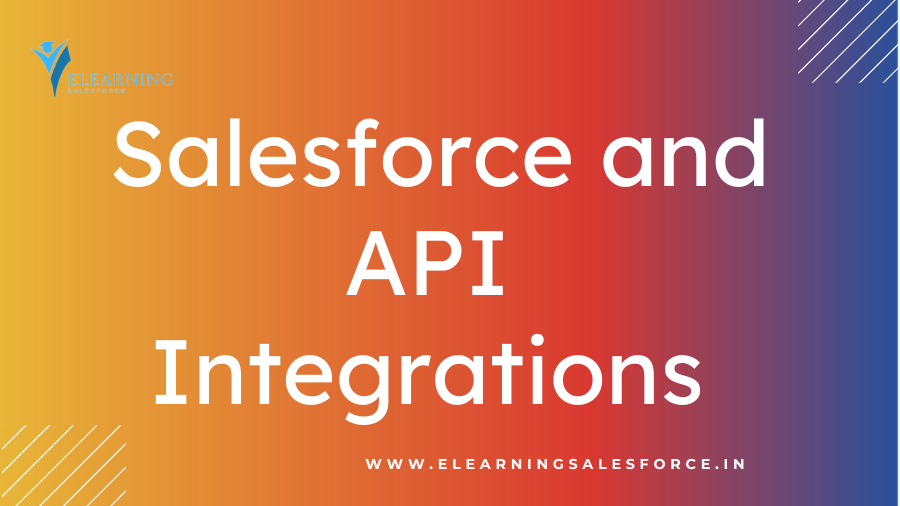In the dynamic digital landscape, the synergy between platforms is crucial for business success. API integrations play a pivotal role in facilitating seamless communication between systems, and Salesforce emerges as a powerhouse in this realm, offering a comprehensive ecosystem for robust API integrations.
The Evolution of API Integrations in Business
API integrations represent a transformative force in the evolution of business operations. From simple data exchange to complex business processes, APIs have become the backbone of modern digital ecosystems, driving efficiency and connectivity across diverse platforms.
Salesforce’s API Ecosystem: A Comprehensive Overview
Salesforce boasts a diverse API ecosystem that caters to a myriad of business needs. Whether it’s integrating data from external sources or automating processes, Salesforce provides a range of APIs, including REST, SOAP, and Bulk APIs, each designed for specific use cases.
Advantages of API Integrations with Salesforce
The advantages of API integrations with Salesforce are manifold. By automating tasks and enabling real-time data exchange, businesses can streamline processes, enhance data accuracy, and create a more agile and responsive operational environment.
Salesforce API Integration Best Practices
While the benefits of API integrations are immense, adopting best practices is crucial. Salesforce emphasizes the importance of ensuring security, data privacy, scalability, and flexibility in API integrations to build sustainable and resilient connections.
Common Challenges in API Integrations and Salesforce Solutions
Despite the benefits, challenges in API integrations may arise. Salesforce addresses these challenges head-on, providing features and tools that mitigate issues such as data inconsistency and integration bottlenecks, ensuring a smooth integration experience.
Real-world Examples: Success Stories with Salesforce API Integrations
Real-world examples showcase the tangible impact of Salesforce API integrations on businesses. From improved efficiency to enhanced customer experiences, these success stories illustrate the transformative power of seamless integrations.
Salesforce and Third-Party App Integrations
Salesforce’s flexibility extends to third-party app integrations. Businesses can seamlessly integrate a variety of third-party applications, expanding the capabilities of Salesforce and creating a more interconnected digital ecosystem.
API Integrations for Enhanced Customer Relationship Management (CRM)
API integrations play a pivotal role in elevating Customer Relationship Management (CRM) experiences. By integrating data from various touchpoints, businesses can personalize interactions, tailor their offerings, and create more meaningful connections with customers.
Salesforce Lightning Platform: Accelerating API Integration Processes
The Salesforce Lightning Platform takes API integrations to the next level. With features designed for speed and efficiency, businesses can accelerate their API integration processes, reducing time-to-market and enhancing overall operational agility.
Data Synchronization: Ensuring Consistency Across Platforms
Data synchronization is a critical aspect of API integrations. Salesforce provides tools and strategies to ensure consistency across platforms, preventing data discrepancies and ensuring that information is up-to-date across the entire ecosystem.
API Integrations in the Era of Digital Transformation
In the era of digital transformation, API integrations become instrumental in shaping a business’s overall strategy. Salesforce aligns seamlessly with organizations undergoing digital transformations, providing the connectivity needed for a comprehensive transformation journey.
Salesforce MuleSoft: Powering Complex API Integrations
Salesforce’s acquisition of MuleSoft further strengthens its capabilities in complex API integrations. MuleSoft’s integration capabilities complement Salesforce, enabling businesses to tackle intricate integration challenges with ease.
Measuring ROI: Assessing the Impact of Salesforce API Integration
Measuring the return on investment (ROI) is crucial for any business initiative. Key performance indicators tailored to API integration help businesses assess the impact of their Salesforce integration, ensuring that they derive maximum value from their investments.
Conclusion: Salesforce’s Role in Pioneering API Integrations
In conclusion, Salesforce stands as a pioneer in driving seamless API integrations. The platform’s commitment to diversity, security, and efficiency in its API ecosystem positions it as a leader in empowering businesses to connect, automate, and thrive in the digital age.
FAQs
- How does Salesforce ensure security in API integrations?
- Salesforce prioritizes security in API integrations through measures such as encryption, access controls, and adherence to best practices.
- Can Salesforce API integration be customized for specific business needs?
- Yes, Salesforce APIs are highly customizable, allowing businesses to tailor integrations to their specific needs and requirements.
- What are the key advantages of using Salesforce Lightning Platform for API integration?
- Salesforce Lightning Platform accelerates API integration processes, reducing time-to-market and enhancing overall operational agility.
- How does Salesforce address challenges in API integrations, such as data inconsistency?
- Salesforce provides features and tools that mitigate challenges in API integration, including ensuring data consistency across platforms.
- What role does Salesforce MuleSoft play in enhancing API integration?
- Salesforce MuleSoft, through its integration capabilities, enhances Salesforce’s capabilities in tackling complex API integration challenges.



